英语(八年级下册英语重点语法和短语)
- 格式:doc
- 大小:28.00 KB
- 文档页数:6
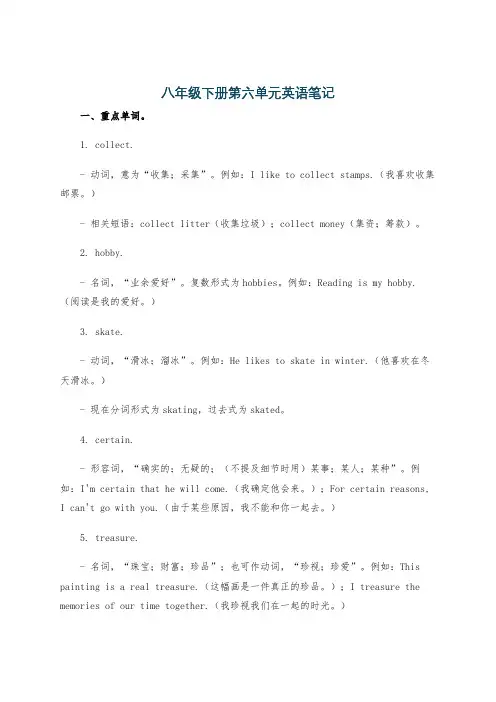
八年级下册第六单元英语笔记一、重点单词。
1. collect.- 动词,意为“收集;采集”。
例如:I like to collect stamps.(我喜欢收集邮票。
)- 相关短语:collect litter(收集垃圾);collect money(集资;筹款)。
2. hobby.- 名词,“业余爱好”。
复数形式为hobbies。
例如:Reading is my hobby.(阅读是我的爱好。
)3. skate.- 动词,“滑冰;溜冰”。
例如:He likes to skate in winter.(他喜欢在冬天滑冰。
)- 现在分词形式为skating,过去式为skated。
4. certain.- 形容词,“确实的;无疑的;(不提及细节时用)某事;某人;某种”。
例如:I'm certain that he will come.(我确定他会来。
);For certain reasons, I can't go with you.(由于某些原因,我不能和你一起去。
)5. treasure.- 名词,“珠宝;财富;珍品”;也可作动词,“珍视;珍爱”。
例如:This painting is a real treasure.(这幅画是一件真正的珍品。
);I treasure the memories of our time together.(我珍视我们在一起的时光。
)6. island.- 名词,“岛”。
例如:There is a beautiful island in the sea.(海里有一个美丽的岛。
)7. page.- 名词,“(书刊或纸张的)页;面;张”。
例如:Turn to page 10.(翻到第10页。
)8. hurry.- 动词,“匆忙;赶快”;名词,“匆忙;急忙”。
- 常用短语:hurry up(赶快;急忙(做某事));in a hurry(匆忙地;急于)。
例如:Hurry up, or we'll be late.(快点,否则我们要迟到了。
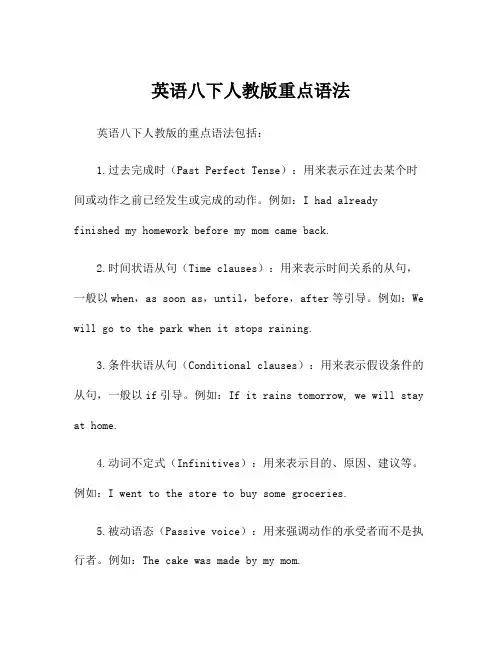
英语八下人教版重点语法
英语八下人教版的重点语法包括:
1.过去完成时(Past Perfect Tense):用来表示在过去某个时间或动作之前已经发生或完成的动作。
例如:I had already
finished my homework before my mom came back.
2.时间状语从句(Time clauses):用来表示时间关系的从句,一般以when,as soon as,until,before,after等引导。
例如:We will go to the park when it stops raining.
3.条件状语从句(Conditional clauses):用来表示假设条件的从句,一般以if引导。
例如:If it rains tomorrow, we will stay at home.
4.动词不定式(Infinitives):用来表示目的、原因、建议等。
例如:I went to the store to buy some groceries.
5.被动语态(Passive voice):用来强调动作的承受者而不是执行者。
例如:The cake was made by my mom.
6.定语从句(Relative clauses):用来修饰名词或代词的从句,一般由关系代词who,which,that引导。
例如:The boy who won
the competition is my neighbor.
这些语法结构在英语八下人教版教材中经常出现,需要学生掌握
和应用。
希望以上回答能对您有帮助。
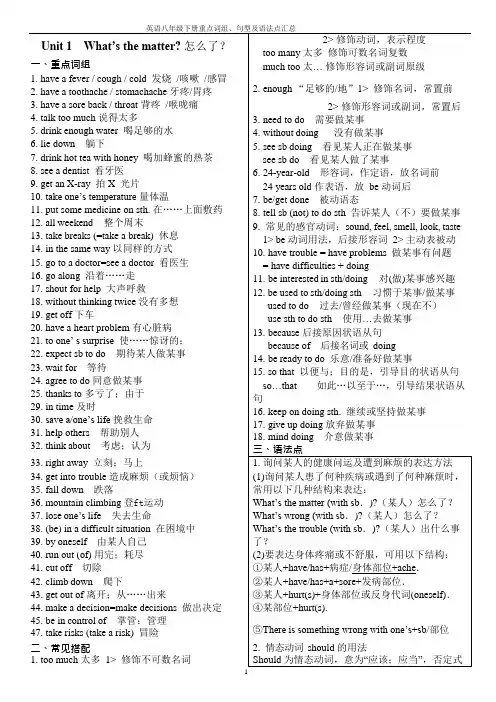
13.be back 回来14.be angry with sb 生某人的气15.throw down 扔下16.the minute=as soon as 一…就…e over 过来18.sit down 坐下19.take sb. for a walk 带某人去散步20.all the time 频繁;反复21.all day / evening 整日/夜22.shout back 大声回应23.walk away 走开24.in surprise 惊讶地25.share the housework 分担家务26.hang out 闲逛27.do chores 做杂务28.go to the store 去商店29.buy drinks and snacks 买饮料和点心30.make sb. do sth. 使某人做某事31.have enough stress from 有来自…足够的压力32.a waste of time 浪费时间33.in order to 为了34.get good grades 取得好成绩35.depend on 依赖;依靠36.have no idea 不知道37.develop children’s independence 发展孩子独立性38.look after=take care of 照顾;照看39.as a result 结果40.agree with sb 同意某人的观点/意见disagree with sb 不同意某人的观点/意见二、常见搭配1.finish doing sth. 完成做某事2.a few “几个”,后接可数名词复数few “很少,几乎没有”,后接可数名词复数a little “一点儿”,后接不可数名词little “很少,几乎没有”,后接不可数名词3.1> question “问题”,需要回答的问题,与ask或answer 搭配2> problem “问题”,需要解决的问题,与solve 搭配in the front of “在…前面”,在所说范围之内5.as…as… “与…一样…”,中间加形容词或副词原级,。
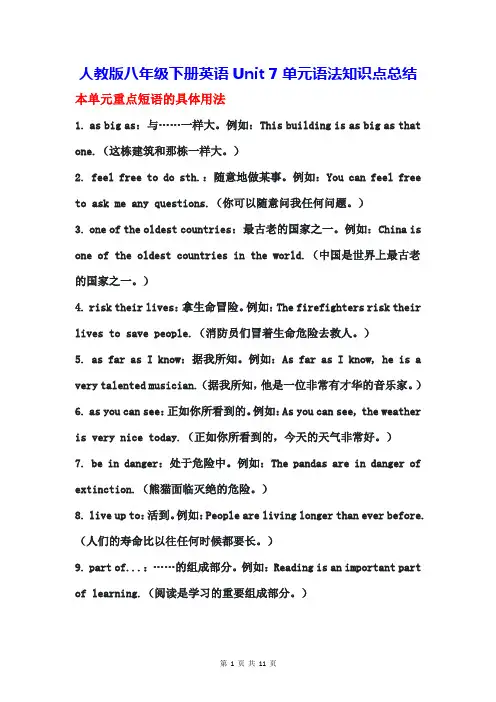
人教版八年级下册英语Unit 7单元语法知识点总结本单元重点短语的具体用法1. as big as:与……一样大。
例如:This building is as big as that one.(这栋建筑和那栋一样大。
)2. feel free to do sth.:随意地做某事。
例如:You can feel free to ask me any questions.(你可以随意问我任何问题。
)3. one of the oldest countries:最古老的国家之一。
例如:China is one of the oldest countries in the world.(中国是世界上最古老的国家之一。
)4. risk their lives:拿生命冒险。
例如:The firefighters risk their lives to save people.(消防员们冒着生命危险去救人。
)5. as far as I know:据我所知。
例如:As far as I know, he is a very talented musician.(据我所知,他是一位非常有才华的音乐家。
)6. as you can see:正如你所看到的。
例如:As you can see, the weather is very nice today.(正如你所看到的,今天的天气非常好。
)7. be in danger:处于危险中。
例如:The pandas are in danger of extinction.(熊猫面临灭绝的危险。
)8. live up to:活到。
例如:People are living longer than ever before.(人们的寿命比以往任何时候都要长。
)9. part of...:……的组成部分。
例如:Reading is an important part of learning.(阅读是学习的重要组成部分。
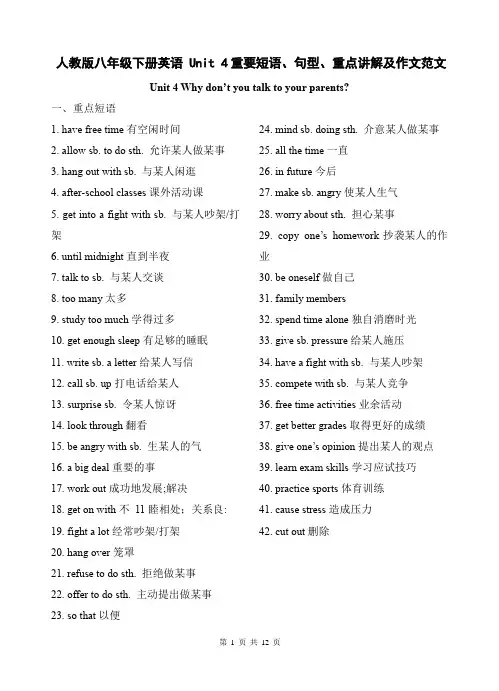
人教版八年级下册英语 Unit 4重要短语、句型、重点讲解及作文范文Unit 4 Why don’t you talk to your parents?一、重点短语1. have free time有空闲时间2. allow sb. to do sth. 允许某人做某事3. hang out with sb. 与某人闲逛4. after-school classes课外活动课5. get into a fight with sb. 与某人吵架/打架6. until midnight直到半夜7. talk to sb. 与某人交谈8. too many太多9. study too much学得过多10. get enough sleep有足够的睡眠11. write sb. a letter给某人写信12. call sb. up打电话给某人13. surprise sb. 令某人惊讶14. look through翻看15. be angry with sb. 生某人的气16. a big deal重要的事17. work out成功地发展;解决18. get on with不11睦相处;关系良:19. fight a lot经常吵架/打架20. hang over笼罩21. refuse to do sth. 拒绝做某事22. offer to do sth. 主动提出做某事23. so that以便24. mind sb. doing sth. 介意某人做某事25. all the time一直26. in future今后27. make sb. angry使某人生气28. worry about sth. 担心某事29. copy one’s homework抄袭某人的作业30. be oneself做自己31. family members32. spend time alone独自消磨时光33. give sb. pressure给某人施压34. have a fight with sb. 与某人吵架35. compete with sb. 与某人竞争36. free time activities业余活动37. get better grades取得更好的成绩38. give one’s opinion提出某人的观点39. learn exam skills学习应试技巧40. practice sports体育训练41. cause stress造成压力42. cut out删除第1页共12页二、重点句型1. I studied until mid night last night so I didn’t get enough sleep.我昨晚学习到半夜所以睡眠不足。
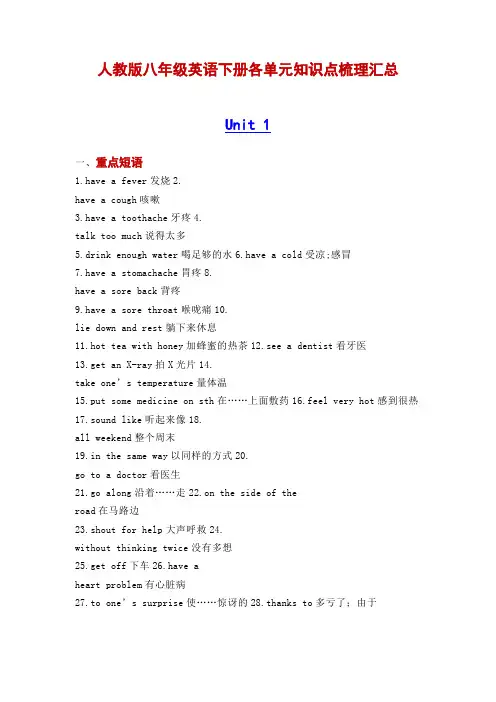
人教版八年级英语下册各单元知识点梳理汇总Unit 1一、重点短语1.have a fever发烧2.have a cough咳嗽3.have a toothache牙疼4.talk too much说得太多5.drink enough water喝足够的水6.have a cold受凉;感冒7.have a stomachache胃疼8.have a sore back背疼9.have a sore throat喉咙痛10.lie down and rest躺下来休息11.hot tea with honey加蜂蜜的热茶12.see a dentist看牙医13.get an X-ray拍X光片14.take one’s temperature量体温15.put some medicine on sth在……上面敷药16.feel very hot感到很热17.sound like听起来像18.all weekend整个周末19.in the same way以同样的方式20.go to a doctor看医生21.go along沿着……走22.on the side of theroad在马路边23.shout for help大声呼救24.without thinking twice没有多想25.get off下车26.have aheart problem有心脏病27.to one’s surprise使……惊讶的28.thanks to多亏了;由于29.in time及时30.save a life挽救生命31.get into trouble造成麻烦32.right away立刻;马上33.because of由于34.get out of离开35.hurt oneself受伤36.put a bandage on sth.用绷带包扎37.fall down摔倒38.feel sick感到恶心39.have a nosebleed流鼻血40.cut his knee割伤他的膝盖41.put her head back把她的头向后仰42.have problems breathing呼吸困难43.mountain climbing登山运动44.be used to doing sth.习惯做某事45.run out(of)用完;用尽46.so that以便47.so…that如此……以至于……48.be in control of掌管;管理49.in a difficult situation在逆境屮50.keep on doing sth.坚持做某事51.make a decision做出决定52.take risks冒险53.give up放弃二、重点句型1.You need to take breaks away from the computer.你需要远离电脑,休息一下。
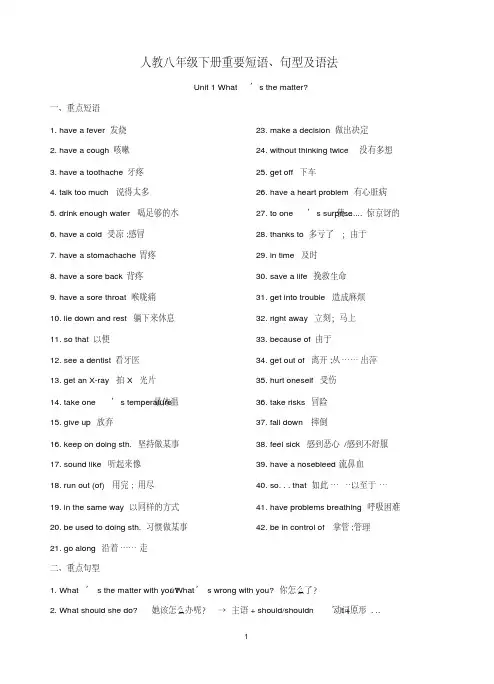
人教八年级下册重要短语、句型及语法Unit 1 What’s the matter?一、重点短语1. have a fever 发烧2. have a cough 咳嗽3. have a toothache 牙疼4. talk too much 说得太多5. drink enough water 喝足够的水6. have a cold 受凉;感冒7. have a stomachache 胃疼8. have a sore back 背疼9. have a sore throat 喉咙痛10. lie down and rest 躺下来休息11. so that 以便12. see a dentist 看牙医13. get an X-ray 拍X 光片14. take one’s temperature量体温15. give up 放弃16. keep on doing sth. 坚持做某事17. sound like 听起来像18. run out (of) 用完; 用尽19. in the same way 以同样的方式20. be used to doing sth. 习惯做某事21. go along 沿着……走23. make a decision 做出决定24. without thinking twice 没有多想25. get off 下车26. have a heart problem 有心脏病27. to one’s surprise使....... 惊京讶的28. thanks to 多亏了;由于29. in time 及时30. save a life 挽救生命31. get into trouble 造成麻烦32. right away 立刻;马上33. because of 由于34. get out of 离开;从……出萍35. hurt oneself 受伤36. take risks 冒险37. fall down 摔倒38. feel sick 感到恶心/感到不舒服39. have a nosebleed 流鼻血40. so. . . that 如此……以至于…41. have problems breathing 呼吸困难42. be in control of 掌管;管理二、重点句型1. What’ s the matter with you?/ What’ s wrong with you?你怎么了?2. What should she do? 她该怎么办呢?→ 主语+ should/shouldn’t +动词原形. ..①You should lie down and rest. 你应该躺下休息一会儿。
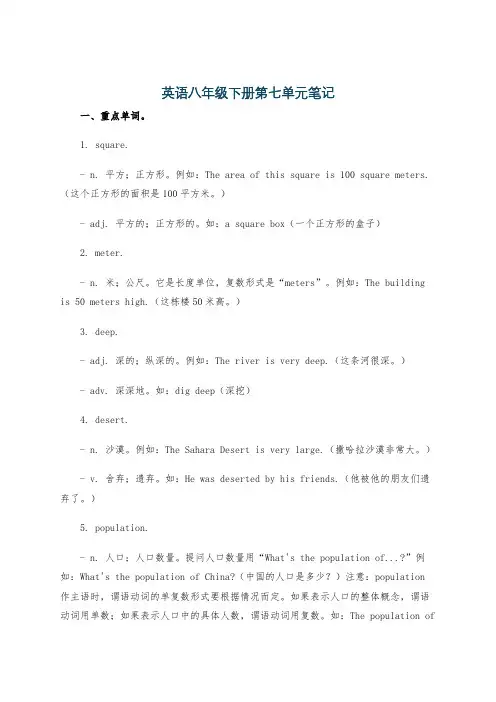
英语八年级下册第七单元笔记一、重点单词。
1. square.- n. 平方;正方形。
例如:The area of this square is 100 square meters.(这个正方形的面积是100平方米。
)- adj. 平方的;正方形的。
如:a square box(一个正方形的盒子)2. meter.- n. 米;公尺。
它是长度单位,复数形式是“meters”。
例如:The building is 50 meters high.(这栋楼50米高。
)3. deep.- adj. 深的;纵深的。
例如:The river is very deep.(这条河很深。
)- adv. 深深地。
如:dig deep(深挖)4. desert.- n. 沙漠。
例如:The Sahara Desert is very large.(撒哈拉沙漠非常大。
)- v. 舍弃;遗弃。
如:He was deserted by his friends.(他被他的朋友们遗弃了。
)5. population.- n. 人口;人口数量。
提问人口数量用“What's the population of...?”例如:What's the population of China?(中国的人口是多少?)注意:population作主语时,谓语动词的单复数形式要根据情况而定。
如果表示人口的整体概念,谓语动词用单数;如果表示人口中的具体人数,谓语动词用复数。
如:The population ofthe city is large.(这个城市的人口众多。
)One third of the population here are workers.(这里三分之一的人口是工人。
)6. Asia.- n. 亚洲。
例如:China is in Asia.(中国在亚洲。
)7. tour.- n. 旅行;旅游。
例如:They are on a tour of France.(他们正在法国旅行。
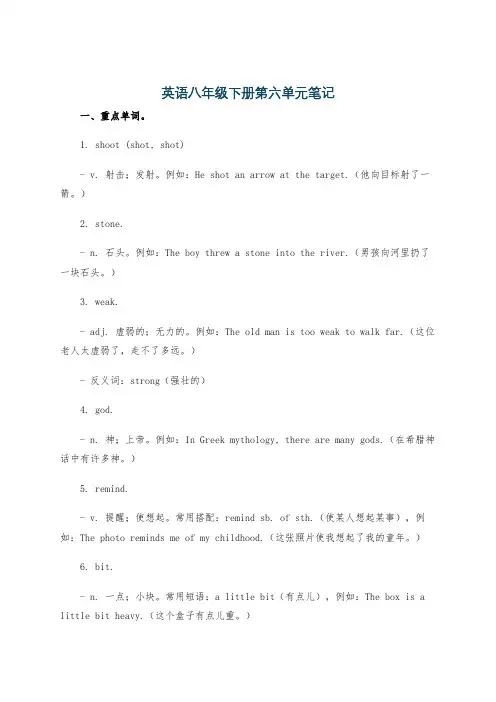
英语八年级下册第六单元笔记一、重点单词。
1. shoot (shot, shot)- v. 射击;发射。
例如:He shot an arrow at the target.(他向目标射了一箭。
)2. stone.- n. 石头。
例如:The boy threw a stone into the river.(男孩向河里扔了一块石头。
)3. weak.- adj. 虚弱的;无力的。
例如:The old man is too weak to walk far.(这位老人太虚弱了,走不了多远。
)- 反义词:strong(强壮的)4. god.- n. 神;上帝。
例如:In Greek mythology, there are many gods.(在希腊神话中有许多神。
)5. remind.- v. 提醒;使想起。
常用搭配:remind sb. of sth.(使某人想起某事),例如:The photo reminds me of my childhood.(这张照片使我想起了我的童年。
)6. bit.- n. 一点;小块。
常用短语:a little bit(有点儿),例如:The box is a little bit heavy.(这个盒子有点儿重。
)7. silly.- adj. 愚蠢的;不明事理的。
例如:Don't be silly.(别傻了。
)8. instead of.- 代替;反而。
例如:I will go instead of you.(我将代替你去。
)二、重点短语。
1. work on.- 致力于;从事。
例如:He is working on a new project.(他正在从事一个新项目。
)2. as soon as.- 一……就……。
引导时间状语从句,例如:As soon as he arrives, we will start.(他一到,我们就开始。
)3. continue to do sth./continue doing sth.- 继续做某事。
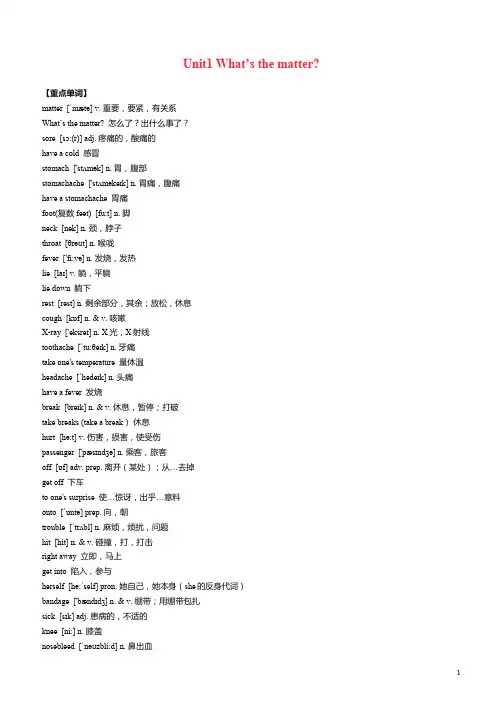
Unit1 What’s the matter?【重点单词】matter [ˈmætə] v. 重要,要紧,有关系What’s the matter? 怎么了?出什么事了?sore [sɔ:(r)] adj. 疼痛的,酸痛的have a cold 感冒stomach ['stʌmək] n. 胃,腹部stomachache ['stʌməkeɪk] n. 胃痛,腹痛have a stomachache 胃痛foot(复数feet) [fu:t] n. 脚neck [nek] n. 颈,脖子throat [θrəʊt] n. 喉咙fever ['fi:və] n. 发烧,发热lie [laɪ] v. 躺,平躺lie down 躺下rest [rest] n. 剩余部分,其余;放松,休息cough [kɒf] n. & v. 咳嗽X-ray ['eksreɪ] n. X光,X射线toothache [ˈtu:θeɪk] n. 牙痛take one's temperature 量体温headache [ˈhedeɪk] n. 头痛have a fever 发烧break [breɪk] n. & v. 休息,暂停;打破take breaks (take a break)休息hurt [hə:t] v. 伤害,损害,使受伤passenger ['pæsɪndʒə] n. 乘客,旅客off [ɒf] adv. prep. 离开(某处);从…去掉get off 下车to one's surprise 使…惊讶,出乎…意料onto [ˈɒntə] prep. 向,朝trouble [ˈtrʌbl] n. 麻烦,烦扰,问题hit [hit] n. & v. 碰撞,打,打击right away 立即,马上get into 陷入,参与herself [hə:ˈself] pron. 她自己,她本身(she的反身代词)bandage ['bændɪdʒ] n. & v. 绷带;用绷带包扎sick [sɪk] adj. 患病的,不适的knee [ni:] n. 膝盖nosebleed [ˈnəʊzbli:d] n. 鼻出血breathe [bri:ð] v. 呼吸sunburned [ˈsʌnbɜ:nd] adj. 晒伤的ourselves [ɑ:ˈselvz] pron. 我们自己(we的反身代词)climber [ˈklaɪmə(r)] n. 登山者be used to 习惯于… 适应于…risk [rɪsk] n. & v. 风险,危险;冒险take risks (take a risk) 冒险accident [ˈæksidənt] n. 意外事件;事故situation [ˌsitjuˈeiʃən] n. 状况,形式,情况kg=kilogram [ˈkɪləgræm] n. 公斤,千克rock [rɔk] n. 岩石run out (of) 用尽,耗尽knife [naif] n. 刀,餐刀cut off 切除blood [blʌd] n. 血mean [mi:n] v. 意味着,意思是,意欲get out of 离开,从… 出来importance [ɪmˈpɔ:tns] n. 重要性decision [dɪ'sɪʒn] n. 决心,决定,抉择control [kən'trəʊl] v. 控制,支配,操纵be in control of 掌管,管理spirit ['spɪrɪt] n. 勇气,意志death [deθ] n. 死亡give up 放弃nurse [nə:s] n. 护士【重点短语】1.have a fever 发烧2.have a cough 咳嗽3.have a toothache 牙疼4.talk too much 说得太多5.drink enough water 喝足够的水6.have a cold 受凉;感冒7.have a stomachache 胃疼8.have a sore back 背疼9.have a sore throat 喉咙痛10. take risks 冒险11.hot tea with honey 加蜂蜜的热茶12.see a dentist 看牙医13.get an X-ray 拍X 光片14.take one’ s temperature 量体温15.put some medicine on sth. 在……上面敷药16. give up 放弃17. sound like 听起来像18. all weekend 整个周末19. in the same way 以同样的方式20. go to a doctor 看医生21. go along 沿着……走22. on the side of the road 在马路边23. shout for help 大声呼救24. without thinking twice 没有多想25. get off 下车26. have a heart problem 有心脏病27. to one’ s surprise 另某人惊讶的是28. thanks to 多亏了;由于29. in time 及时30. make a decision 做出决定31. get into trouble 造成麻烦32. right away 立刻;马上33. because of 由于34. get out of 离开;从……出来35. keep on doing sth. 继续或坚持做某事36. put a bandage on sth. 用绷带包扎37. fall down 摔倒38. feel sick 感到恶心39. have a nosebleed 流鼻血40. cut his knee 割伤他的膝盖41. put her head back 把她的头向后仰42. have problems breathing 呼吸困难43. mountain climbing 登山运动44. be used to doing sth. 习惯做某事45. run out (of) 用完;用尽46. so that 以便47. so...that... 如此……以至于...…48. be in control of 掌管;管理49. in a difficult situation 在闲境中【重点句型】1. What's the matter with you?= What'the trouble with you? = What's wrong with you? 你怎么了?2. What should she do? 她该怎么办呢?3.Should I take my temperature? 我应该量一下体温吗?4.You should lie down and rest. 你应该躺下休息一会儿。
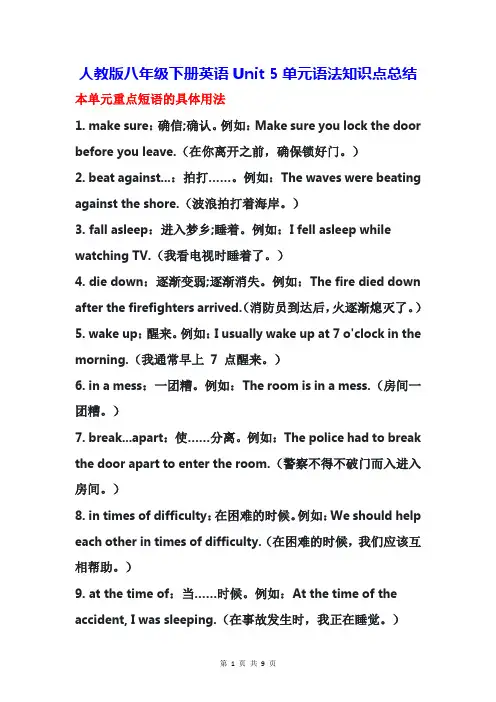
人教版八年级下册英语Unit 5单元语法知识点总结本单元重点短语的具体用法1. make sure:确信;确认。
例如:Make sure you lock the door before you leave.(在你离开之前,确保锁好门。
)2. beat against...:拍打……。
例如:The waves were beating against the shore.(波浪拍打着海岸。
)3. fall asleep:进入梦乡;睡着。
例如:I fell asleep while watching TV.(我看电视时睡着了。
)4. die down:逐渐变弱;逐渐消失。
例如:The fire died down after the firefighters arrived.(消防员到达后,火逐渐熄灭了。
)5. wake up:醒来。
例如:I usually wake up at 7 o'clock in the morning.(我通常早上7 点醒来。
)6. in a mess:一团糟。
例如:The room is in a mess.(房间一团糟。
)7. break...apart:使……分离。
例如:The police had to break the door apart to enter the room.(警察不得不破门而入进入房间。
)8. in times of difficulty:在困难的时候。
例如:We should help each other in times of difficulty.(在困难的时候,我们应该互相帮助。
)9. at the time of:当……时候。
例如:At the time of the accident, I was sleeping.(在事故发生时,我正在睡觉。
)10. go off:(闹钟)发出响声。
例如:The alarm went off at 6 o'clock.(闹钟在6 点钟响了。
人教版初中英语八年级下册全册各单元知识点、语法归纳整理Unit1W hat’s the matter?一.重点短语归纳1.foot---feet脚tooth---teeth牙齿2.have a cold感冒3.have a stomachache胃疼4.have a sore back背疼5.have a sore throat喉咙疼6.have a fever发烧7.lie down and(have a)rest躺下休息have a rest休息8.hot tea with honey加蜜的热茶9.see a dentist看牙医see a doctor看医生10.drink lots of water多喝水11.lots of ,a lot of,许多。
大量a lota lot of=lots of,可以修饰可数名词复数和不可数名词,一般用在肯定句中。
:There are lots of(a lot of)books in our library.There is a lot of water on the grounda lot,是一个副词词组,跟动词连用;表示十分,很等意思;Thanks a lot.12.have a toothache牙疼13.That’s a good idea好主意14.go to bed去睡觉go to bed early早上床睡觉15.feel well感到好 feel ill感到不舒服I don’t feel well=I’m not feeling well我感觉不舒服.16.start doing/to do sth开始做某事to do是一件事情完成了,开始做另外一件事情doing是原来的那件事情做到一半,现在又开始做了,是同一件事情。
17.two days ago两天前18.get some rest多休息,休息一会儿19.I think so我认为是这样20.be thirsty口渴21.be hungry饥饿22.be stressed out紧张23.listen to music听音乐24.healthy lifestyle健康的生活方式25.traditional Chinese doctors传统中医26.need to do sth需要做某事I have a toothache.I need to see a dentist.我牙痛,我需要去看牙医.We need to keep our classroom clean.我们需要保持教室的干净.27.too much+不可数名词太多的…much too+形/副实在太…极其,非常too many+可数名词复数太多的…28.be good for sth./doing sth.对什么有益,对什么有好处be bad for sth./doing sth.对什么有害be good to对…好be good at=do well in在……方面好,擅长be good(bad) for、be good at的相关用法1.be good for对......有益Doing morning exercises is good for your health.做早操对你们的建康有益。
学习好资料欢迎下载人教八下重要短语、句子汇总Unit 1 What's the matter?一、重点短语1. have a fever 发烧23. make a decision 做出决定2. have a cough 咳嗽24. without thinking twice 没有多想3. have a toothache 牙疼25. get off 下车4. talk too much 说得太多26. have a heart problem 有心脏病5. drink enough water 喝足够的水27. to one's surprise 使....... 惊京讶的6. have a cold 受凉;感冒28. thanks to 多亏了;由于7. have a stomachache 胃疼29. in time 及时8. have a sore back 背疼30. save a life 挽救生命9. have a sore throat 喉咙痛31. get into trouble 造成麻烦10. lie down and rest 躺下来休息32. right away 立刻;马上11. so that 以便33. because of 由于12. see a dentist 看牙医34. get out of 离开;从……出萍13. get an X-ray 拍X 光片35. hurt oneself 受伤14. take one's temperature 量体温36. take risks 冒险15. give up 放弃37. fall down 摔倒16. keep on doing sth. 坚持做某事38. feel sick 感到恶心/感到不舒服17. sound like 听起来像39. have a nosebleed 流鼻血18. run out (of) 用完;用尽40. so. . . that 如此……以至于…19. in the same way 以同样的方式41. have problems breathing 呼吸困难20. be used to doing sth. 习惯做某事42. be in control of 掌管;管理21. go along 沿着……走二、重点句型1. What' s the matter with you? / What' s wrong with you?你怎么了?2. What should she do?她该怎么办呢?→主语+ should/shouldn't + 动词原形. ..①You should lie down and rest.你应该躺下休息一会儿。
Unit 11.将会有更多的树There will be more trees. There will be more/ fewer + 名词复数2.将会有更少的污染There will be less pollution.There will be more/ less +不可数名词3.爱上某人/某物fall in love with sth./ sb.4.会做某事 be able to do sth.(1) I am able to sing English songs.=I can sing English songs.(2) They were able to play the pianowhen they were 8 years old.They could play the piano whenthey were 8 years old. (3) I’ll be able to dress more casually.=I can dress more casually.5.实现come true6.one of +the +adj.最高级+名词复数one of the biggest movie companies 7.在某方面帮助某人help sb. with sth.帮助某人做某事helpsb. (to) do sth.8.数百年hundreds ofyears九百学生nine hundredstudents9.试着干某事try to do10.使某人干某事makesb. do sth.11.It’s adj. for sb. to dosth.12.想要干某事would liketo do sth.Unit 21.不让..进入keep out2.过时的out of style3.打电话给call sb. up4.What’s wrong (withsb._?=What’s the matter(withsb.)?5.与…一样the sameas…6.找到时间做……fit time into doing sth.7.尽可能as… as possibleSpeak English as much aspossible.8.在一方面on the onehand9.在另一方面on theother hand10.各种各样的all kindsof11.一张球赛的票a ticket to a ball game我自行车的钥匙the key to my bike12.谈论talk about13.write sb. a letter=write a letter to sb.= writeto sb.14.和某人争吵arguewith sb.为某事争吵argueabout sth.15.告诉某人(不)做..tell sb. (not) to do sth.16.向某人借某物borrow sth. from sb.17.与某人相处融洽get on(along) well withsb.18. It’s time for sth.It’s time for sb. to dosth.19.看见某人正在做某事see sb. doing sth.20.find it + adj. (for sb.)to do sth.Unit 31.出去,离开get out (of)2.起飞take off3.逃跑run away4.听说hear about / of5.发生take place6.考虑做某事thinkabout doing sth.7.要求某人(不)做某事ask sb. (not) to do sth.8.默默地in slience有危险in danger9.对某人有意义havemeaning to sb.10.和…一样… as adj./adv.原形asUnit 41.生某人的气be mad atsb.=be angry with sb.=be annoyed with sb.2.传递信息给某人pass on the message to sb.3.被期望做某事be supposed to do sth.4.擅长be good at+sth./doing sth.=do well in +sth./doing sth.He is good at reading.= He does well in reading.I do better in math thanChinese.=I am better at math thanChinese.5. I am sorry to hear that.be sorry to do sth.6.做某事很吃惊besurprised to do7.派某人去做某事sendsb. to do sth.8.让她感到难受makeher feel sick使某人做某事make sb.do sth.9.同意某人的决定agree with one’s decision决定做某事make a decision to dosth.=decide to do sth.10.打开学生对外部世界的视野open up students’ eyes tothe outsideworld11.给他们的人生一个好的开始give them a good start inlife12.过得愉快enjoy one’stime =enjoy oneself = have agreat/ good /nice/ wonderful time13. 照料;照顾care forWWF cares for wildanimalsin danger.Unit 51.开晚会的好时间a good time to have aparty2.把…带走take it/ themawaytake away the book=take the book away3.环游世界travel around/all over theworld4.接受教育get aneducation5.赚大量的钱make a lot of/muchmoney6.做某事谋生make aliving doing sth.= do sth. for a livingplay sports for a living=make a living playingsports7. I can’t remember howto getto your house.I don’t know how to doit.Can you tell me what todo?Do you know where togo?8. 让某人(不)做某事let sb. (not) do sth.Unit 61. Alison was the first one______(start).第一个(最后)做某事的人the first (last) one to do sth.2.愿意做某事would like to do sth.3.感谢做某事Thanks for doing sth.4.用完…… run out of…5. I have a big globe with bears in it.6. My hobby is ________(collect) coins.7.做完某事finish doing sth.8.对……感兴趣be interested in sb./sth.对做某事感兴趣be interested in doing sth.9. ……的首都/省会the capital of …10.一个有着丰富历史的城市 a city with a very colorful history11.对某人来说,做某事是有趣的。
Unit1 What’s the matter?【重点单词】matter [ˈmætə] v. 重要,要紧,有关系What’s the matter? 怎么了?出什么事了?sore [sɔ:(r)] adj. 疼痛的,酸痛的have a cold 感冒stomach ['stʌmək] n. 胃,腹部stomachache ['stʌməkeɪk] n. 胃痛,腹痛have a stomachache 胃痛foot(复数feet) [fu:t] n. 脚neck [nek] n. 颈,脖子throat [θrəʊt] n. 喉咙fever ['fi:və] n. 发烧,发热lie [laɪ] v. 躺,平躺lie down 躺下rest [rest] n. 剩余部分,其余;放松,休息cough [kɒf] n. & v. 咳嗽X-ray ['eksreɪ] n. X光,X射线toothache [ˈtu:θeɪk] n. 牙痛take one's temperature 量体温headache [ˈhedeɪk] n. 头痛have a fever 发烧break [breɪk] n. & v. 休息,暂停;打破take breaks (take a break)休息hurt [hə:t] v. 伤害,损害,使受伤passenger ['pæsɪndʒə] n. 乘客,旅客off [ɒf] adv. prep. 离开(某处);从…去掉get off 下车to one's surprise 使…惊讶,出乎…意料onto [ˈɒntə] prep. 向,朝trouble [ˈtrʌbl] n. 麻烦,烦扰,问题hit [hit] n. & v. 碰撞,打,打击right away 立即,马上get into 陷入,参与herself [hə:ˈself] pron. 她自己,她本身(she的反身代词)bandage ['bændɪdʒ] n. & v. 绷带;用绷带包扎sick [sɪk] adj. 患病的,不适的knee [ni:] n. 膝盖nosebleed [ˈnəʊzbli:d] n. 鼻出血breathe [bri:ð] v. 呼吸sunburned [ˈsʌnbɜ:nd] adj. 晒伤的ourselves [ɑ:ˈselvz] pron. 我们自己(we的反身代词)climber [ˈklaɪmə(r)] n. 登山者be used to 习惯于… 适应于…risk [rɪsk] n. & v. 风险,危险;冒险take risks (take a risk) 冒险accident [ˈæksidənt] n. 意外事件;事故situation [ˌsitjuˈeiʃən] n. 状况,形式,情况kg=kilogram [ˈkɪləgræm] n. 公斤,千克rock [rɔk] n. 岩石run out (of) 用尽,耗尽knife [naif] n. 刀,餐刀cut off 切除blood [blʌd] n. 血mean [mi:n] v. 意味着,意思是,意欲get out of 离开,从… 出来importance [ɪmˈpɔ:tns] n. 重要性decision [dɪ'sɪʒn] n. 决心,决定,抉择control [kən'trəʊl] v. 控制,支配,操纵be in control of 掌管,管理spirit ['spɪrɪt] n. 勇气,意志death [deθ] n. 死亡give up 放弃nurse [nə:s] n. 护士【重点短语】1.have a fever 发烧2.have a cough 咳嗽3.have a toothache 牙疼4.talk too much 说得太多5.drink enough water 喝足够的水6.have a cold 受凉;感冒7.have a stomachache 胃疼8.have a sore back 背疼9.have a sore throat 喉咙痛10. take risks 冒险11.hot tea with honey 加蜂蜜的热茶12.see a dentist 看牙医13.get an X-ray 拍X 光片14.take one’ s temperature 量体温15.put some medicine on sth. 在……上面敷药16. give up 放弃17. sound like 听起来像18. all weekend 整个周末19. in the same way 以同样的方式20. go to a doctor 看医生21. go along 沿着……走22. on the side of the road 在马路边23. shout for help 大声呼救24. without thinking twice 没有多想25. get off 下车26. have a heart problem 有心脏病27. to one’ s surprise 另某人惊讶的是28. thanks to 多亏了;由于29. in time 及时30. make a decision 做出决定31. get into trouble 造成麻烦32. right away 立刻;马上33. because of 由于34. get out of 离开;从……出来35. keep on doing sth. 继续或坚持做某事36. put a bandage on sth. 用绷带包扎37. fall down 摔倒38. feel sick 感到恶心39. have a nosebleed 流鼻血40. cut his knee 割伤他的膝盖41. put her head back 把她的头向后仰42. have problems breathing 呼吸困难43. mountain climbing 登山运动44. be used to doing sth. 习惯做某事45. run out (of) 用完;用尽46. so that 以便47. so...that... 如此……以至于...…48. be in control of 掌管;管理49. in a difficult situation 在闲境中【重点句型】1. What's the matter with you?= What'the trouble with you?= What's wrong with you? 你怎么了?2. What should she do? 她该怎么办呢?3.Should I take my temperature? 我应该量一下体温吗?4.You should lie down and rest. 你应该躺下休息一会儿。
人教版八年级下册英语Unit 3单元语法知识点总结本单元重点短语的具体用法1. do the dishes:洗餐具- I need to do the dishes before going out.(我出门前需要洗餐具。
)2. take out the rubbish:倒垃圾- Can you take out the rubbish, please?(你能倒一下垃圾吗?)3. fold your clothes:叠衣服- Remember to fold your clothes neatly.(记得把你的衣服叠整齐。
)4. sweep the floor:扫地- She sweeps the floor every day.(她每天都扫地。
)5. make your bed:整理床铺- It's your turn to make your bed.(轮到你整理床铺了。
)6. clean the living room:打扫客厅- We need to clean the living room before guests arrive.(在客人到来之前,我们需要打扫客厅。
)7. go out for dinner:出去吃饭- Let's go out for dinner tonight.(我们今晚出去吃饭吧。
)8. go to the movies:去看电影- They like to go to the movies on weekends.(他们喜欢在周末去看电影。
)9. stay out late:在外面待到很晚- Don't stay out late, it's not safe.(别在外面待太晚,不安全。
)10. get a ride:搭车- I'll get a ride with my friend.(我会和我朋友一起搭车。
)11. work on doing sth:从事做某事- He is working on writing a novel.(他正在写一本小说。
人教版八年级下册各单元英语语法解析知识重点总结新目标英语八年级(下)重点短语及句型总Unit 1 Will people have robots?1. fewer people 更少的人(fewer 修饰名词复数,表示否定)2. less free time 更少的空闲时间(less 修饰不可数名词,表示否定)3. in ten years 10年后(in 的时间短语用于将来时,提问用How soon)4. fall in love with … 爱上……例:When I met Mr. Xu for the first time, I fell inlove with him at once.当我第一次见到许老师,我立刻爱上他。
5. live alone 单独居住6. feel lonely 感到孤独(比较:live alone/ go alone 等)The girl walked alone along the street, but shedidn't feel lonely.那女孩独自沿着街道走,但她并不感到孤独。
7. keep/ feed a pet pig 养一头宠物猪8. fly to the moon 飞上月球9. hundreds of + 复数数百/几百(概数,类似还有thousands of;millions of)10. the same as 和……相同11. A be different from B A与B不同(= There is a difference/ Thgere aredifferences between A and B)12. wake up 醒来(wake sb. up 表示“唤醒某人”)13. get bored 变得厌倦(get/ become 是连系动词,后跟形容词如tired/angry/ excited 等)14. go skating 去滑冰(类似还有go hiking/ fishing /skating/ bike riding 等)15. lots of/ a lot of 许多(修饰可数名词、不可数名词都可以)16. at the weekends 在周末17. study at home on computers 在家通过电脑学习18. agree with sb. 同意某人(的意见)19. I don't agree. = I disagree. 我不同意。
八年级下册重点语法和短语Unit 1 Will people have robots重点语法:一般将来时态的应用do/does 的一般将来时态形式:(shall/will) dodo/does 的一般将来时态的被动语态:(shall/will) be done一般将来时态的肯定句、否定句、疑问句形式:肯定句例句:People will have robots in a few years.否定句例句:People (will not/won't) have robots in a few years.一般疑问句例句:Will people have robots in a few years特殊疑问句例句:What will people have in a few years重点短语:won't = will notthey'll = they willshe'll = she willhe'll = he willI'll = I willfall in love with(sb./sth.) 爱上(某人/某物)be able to do sth. 能够做某事come true 实现in the future 未来hundreds of 数以百计的thousands of 数以千计的look for(sb./sth.) 寻找(某人/某物)will → would 情态动词will 的原形和过去式may → might 情态动词may 的原形和过去式Reading Strategy(阅读方法)Look at the title and picture, and predict what you will read about. (看着标题和图片,预知你要阅读那些方面的内容。
)This helps you get ready to acquire new information. (这样可以帮助你获得一些新的信息。
)Unit 2 What should I do重点语法:过去将来时态(将来时态的委婉说法)do/does 的过去将来时态形式:(should/would) dodo/does 的过去将来时态的被动语态:(should/would) be done过去将来时态的肯定句、否定句、疑问句形式:肯定句例句:You should write a letter to him.否定句例句:You shouldn't write a letter to him.一般疑问句例句:Should I write a letter to him特殊疑问句例句:What should I do重点短语:keep sb. out 不让某人进入What's wrong = What's the matter = What's the problem 怎么了out of style 不时髦的;过时的call sb. up 给某人打电话pay for sth. 为某事付款part-time job 兼职工作the same as = be same (to/with) 与……同样in style 时髦的;流行的get on [well] with sb. = get along [well] with sb. 与某人相处(好)didn't = did notcouldn't = could notas ... as possible 尽可能……(eg/ as soon as po ssible 尽快)all kinds of 各种;许多on the one hand 一方面on the other hand 另一方面ask sb. for sth. = ask sb. to do sth. 请求某人做某事ask sb. not to do sth. 请求某人不要做某事spend (money) on sth. = spend (money) [in] doing sth. 花钱做某事sth. cost sb. (money) 某人花钱为了某事take sb. sometime to do sth. 花某人时间做某事find out 查明find sb. doing sth. 发现某人做某事be angry with sb. 生某人的气be angry at sth. 生某事的气the same age as = as old as 与某人年龄一样have fight with sb. 与某人打架learn to do sth. 学会做某事not ... until ... 直到……才……compare sth.(A) with sth.(B) 把某事(A)与某事(B)作比较it's time for sth. = it's time to do sth. 到该做某事的时间了maybe adv. 或许may be (情态动词+ 动词原形)可能是shall → should 情态动词shall 的原形和过去式pay → paid → paid 动词pay 的原形、过去式和过去分词Reading Strategy(阅读方法)You will learn to use new words better if you use a learner's dictionary. (时刻学着应用新单词来学习比时刻使用字典这种途径方法更好。
)A bilingual dictionary sometimes gives the wrong meaning for the situation you want. (在某些你需要的场合下,一本双语字典有时会给你错误的解释。
)Unit 3 What were you doing when the UFO arrived重点语法:过去进行时态do/does 的过去进行时态形式:(was/were) doingdo/does 的过去进行时态的被动语态:(was/were) being done过去将来时态的肯定句、否定句和疑问句形式:肯定句例句:I was walking down the street when a UFO landed.否定句例句:I wasn't walking down the street when a UFO landed.一般疑问句例句:Were you walking down the street when a UFO landed特殊疑问句例句:What were you doing when a UFO landed动词when 和while 的选择:when 后加瞬间动词,while 后加延续性动词。
例句:The boy was walking down the street when the UFO landed.=While the boy was walking down the street, the UFO landed.感叹句结构:(1) How + adj. + the + 主语+ 谓语动词=(2) What + (a/an) + [adj.] + n. + 主语+ 谓语动词例句:What a beautiful flower [it is]!=How beautiful the flower is!What beautiful flowers [they are]!=How beautiful the flowers are!重点短语:get out 出去;离开take off 起飞run away 逃跑;跑掉come in 进来hear about = hear of 听说take place 发生as ... as 像……一样(eg/ as old as him 像他一样老)anywhere = everywhere = here and there 任何地方think about 考虑think of 认为get up = get out of the bed 起床at the doctor's 在诊所every day 每一天everyday adj. 日常的most adj. 大部分the most 最多的in space 在太空中national hero 民族英雄all over the world = in the world 全世界Reading Strategy(阅读方法)The title can be helpful for you to understand a text. (一篇文章的标题可以帮助你理解整篇文章。
)It's also a good idea to read the first sentence of each paragraph before you read. (在阅读整篇文章之前,阅读每段的第一句话也是一个很有效的方法。
)Unit 4 He said I was hard-working.重点语法:宾语从句结构:主语+ 谓语动词+ 宾语从句(主语+ 谓语动词+ 宾语/表语)例句:----I'm good at English. He says. (改为加宾语从句的复合句)----He says I'm good at English.注意:①主句是一般现在时态,宾语从句的时态不受其影响。
例句:He says I'm good at English now.He says I was good at mathematics when I was young.②主句是过去时态,宾语从句也要用过去时态。
例句:He said I was good at mathematics when I was young yesterday.He said I was good at English now yesterday.③宾语从句是客观真理时永远用一般现在时态。
例句:Our teacher says 24 hours make a day.Our teacher said the sun gives us so many energy yesterday.④动词原形不能作主语,必须用其-ing 形式。
例句:She said helping others changed her life.重点短语:direct speech 直接引语reported speech = indirect speech 间接引语first of all = at first 首先pass on 传递be supposed to do sth. 应该做某事be good at = do well in 在某方面做得好in good health 身体健康get over 克服open up 打开care for = take care of = look after 照料;照顾not any more = not any longer = no longer 不再have a cold 感冒end-of-year exam 年终考试get nervous 变得紧张forget to do sth. 忘记做某事(该事未做)forget doing sth. 忘记做某事(该事已做)it's + adj. + [for sb.] + to do sth. 做某事[对某人来说]……(加形容词)context 上下文Reading Strategy(阅读方法)First read for meaning, not for detail. (首先理解文段的大致意思,不在于文段的细节部分。